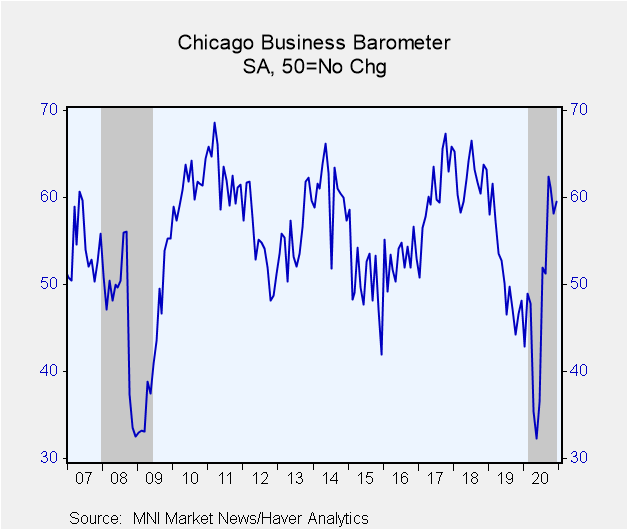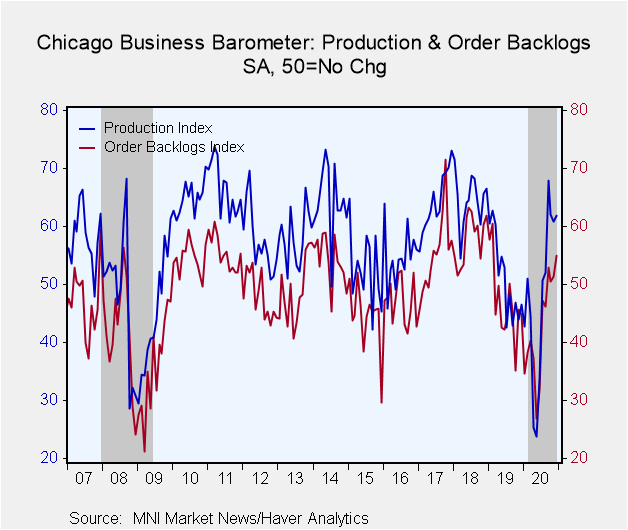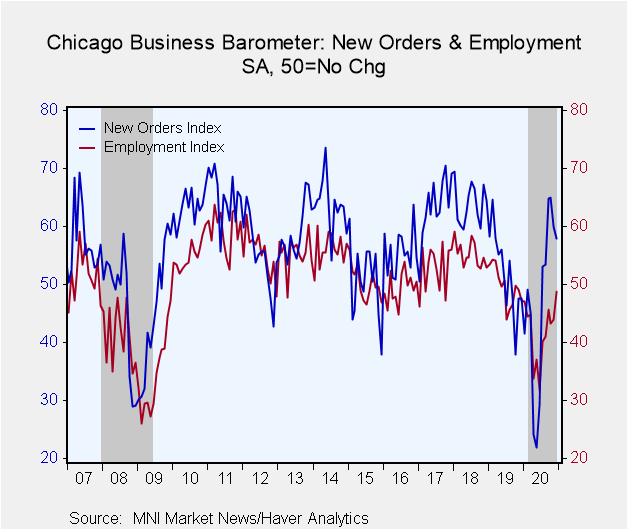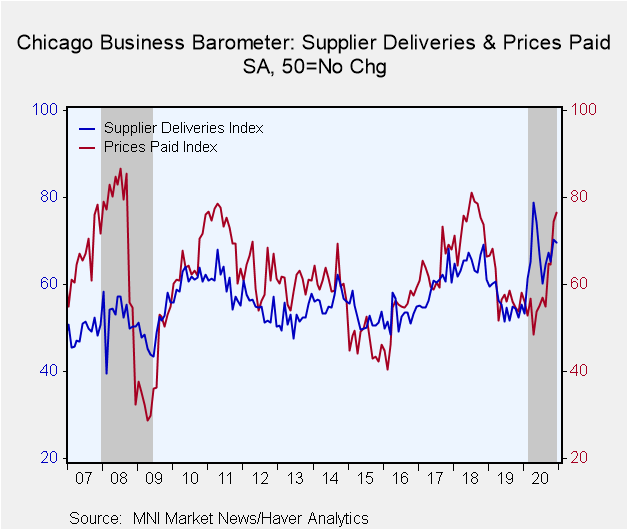 Global| Dec 30 2020
Global| Dec 30 2020Chicago PMI Rises in December
by:Sandy Batten
|in:Economy in Brief
Summary
• Business activity index rises in December after falling to three-month low in November. • Production, order backlogs, employment and inventories gain. • New orders slide. The Chicago Purchasing Managers Business Barometer rebounded [...]
• Business activity index rises in December after falling to three-month low in November.
• Production, order backlogs, employment and inventories gain.
• New orders slide.
The Chicago Purchasing Managers Business Barometer rebounded to 59.5 in December after having fallen to a three-month low of 58.2 during November. A reading above 50 suggests rising activity in the Chicago area. The Action Economics Forecast had looked for a decline to 57.0. In Q4 as a whole, business sentiment recovered further to 59.6, the strongest reading since Q4 2018.
Haver Analytics constructs an ISM-Adjusted Chicago Business Barometer with similar methodology to the ISM Composite Index. This measure rose to 57.6 in December from 56.2 in November and remained well above the low of 40.2 reached this past June.
Among the five main indicators, Employment saw the largest monthly gain, followed by Order Backlogs. New Orders recorded the biggest decline.
Demand eased in December as New Orders slipped 2 points, while Production ticked up by 1.1 points as business activity picked up. On a quarterly basis, both New Orders and Production jumped to a two-year high, pushing the indices up to 61.0 and 61.6, respectively. Order Backlogs rose 3.6 points in December, the second consecutive advance. In Q4 the index rose to 52.3, lifting the indicator above the 50-mark for the first time since Q1 2019. Inventories jumped to a seven-month high in December, leaving the quarterly index at 47.6 in Q4.
Employment saw the largest climb in December, rising to a one-year high. Nevertheless, the indicator has now been in contraction territory since July 2019. Quarterly demand for labor increased to 45.3 in Q4. Delays in Supplier Deliveries remained elevated in December with companies continuing to note delivery delays due to issues with shipping and trucking.
On the inflation front, prices paid at the factory gate expanded 2.2 points, hitting the highest level since September 2018, with firms reporting higher prices for metals. In Q4, the index rose to 71.8, the highest level since Q3 2018.
The MNI Chicago Report is produced by MNI in partnership with ISM-Chicago. The survey is collected online each month from manufacturing and non-manufacturing firms in the Chicago area. Summary data are contained in Haver's USECON database with detail including the ISM-style index in the SURVEYS database.
| Chicago Purchasing Managers Index (%, SA) | Dec | Nov | Oct | Dec '19 | 2020 | 2019 | 2018 |
|---|---|---|---|---|---|---|---|
| General Business Barometer | 59.5 | 58.2 | 61.1 | 48.2 | 49.0 | 51.3 | 62.4 |
| ISM-Adjusted General Business Barometer | 57.6 | 56.2 | 56.7 | 48.6 | 49.6 | 51.4 | 60.8 |
| Production | 61.9 | 60.8 | 62.1 | 46.5 | 48.0 | 51.2 | 64.5 |
| New Orders | 58.0 | 60.0 | 65.0 | 47.6 | 47.1 | 52.0 | 63.8 |
| Order Backlogs | 55.0 | 51.4 | 50.5 | 44.8 | 42.7 | 46.9 | 58.0 |
| Inventories | 49.4 | 45.7 | 47.7 | 46.1 | 44.8 | 48.7 | 55.4 |
| Employment | 48.8 | 44.0 | 43.2 | 47.2 | 41.8 | 49.6 | 55.3 |
| Supplier Deliveries | 69.7 | 70.3 | 65.3 | 55.4 | 66.4 | 55.6 | 64.8 |
| Prices Paid | 76.6 | 74.4 | 64.6 | 58.1 | 59.6 | 58.5 | 73.9 |
Sandy Batten
AuthorMore in Author Profile »Sandy Batten has more than 30 years of experience analyzing industrial economies and financial markets and a wide range of experience across the financial services sector, government, and academia. Before joining Haver Analytics, Sandy was a Vice President and Senior Economist at Citibank; Senior Credit Market Analyst at CDC Investment Management, Managing Director at Bear Stearns, and Executive Director at JPMorgan. In 2008, Sandy was named the most accurate US forecaster by the National Association for Business Economics. He is a member of the New York Forecasters Club, NABE, and the American Economic Association. Prior to his time in the financial services sector, Sandy was a Research Officer at the Federal Reserve Bank of St. Louis, Senior Staff Economist on the President’s Council of Economic Advisors, Deputy Assistant Secretary for Economic Policy at the US Treasury, and Economist at the International Monetary Fund. Sandy has taught economics at St. Louis University, Denison University, and Muskingun College. He has published numerous peer-reviewed articles in a wide range of academic publications. He has a B.A. in economics from the University of Richmond and a M.A. and Ph.D. in economics from The Ohio State University.
More Economy in Brief
 Global| Feb 05 2026
Global| Feb 05 2026Charts of the Week: Balanced Policy, Resilient Data and AI Narratives
by:Andrew Cates










